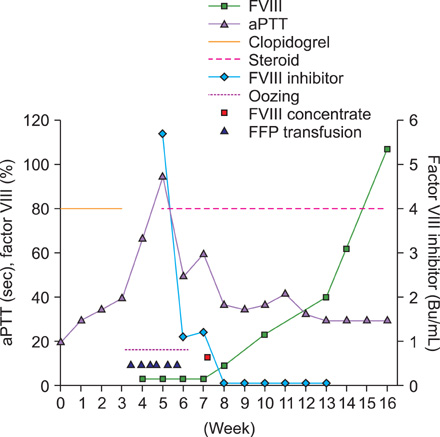Korean J Hematol.
2012 Mar;47(1):80-82. 10.5045/kjh.2012.47.1.80.
A patient with acquired hemophilia A induced by clopidogrel
- Affiliations
-
- 1Division of Hematology-Oncology, Department of Medicine, Wonju Christian Hospital, Yonsei University College of Medicine, Wonju, Korea. kkongg@yonsei.ac.kr
- KMID: 2251976
- DOI: http://doi.org/10.5045/kjh.2012.47.1.80
Abstract
- Acquired hemophilia A (AHA) is a rare bleeding disorder caused by autoantibodies against factor VIII (FVIII). Treatment with clopidogrel is a cause of AHA, but its clinical course is unknown. Recently, we treated a 65-year-old man who was hospitalized for cerebellar infarction and had a prolonged activated partial thromboplastin time (aPTT) with soft tissue oozing after 3 weeks of clopidogrel use. We terminated clopidogrel administration and transfused the patient with fresh frozen plasma. However, the aPTT increased up to 98.8 seconds, and the FVIII and FVIII inhibitor levels were <1% and 5.4 Bethesda units/mL, respectively. Clopidogrel-associated AHA was considered, and we began steroid treatment. Two months later, FVIII, FVIII inhibitor, and aPTT values were normalized. No further bleeding or aPTT prolongation has been reported during the 2-year follow-up period. AHA should be considered in patients taking clopidogrel and experiencing bleeding, unless the platelet count and coagulation screen are normal.
MeSH Terms
Figure
Cited by 1 articles
-
Characterization of anti-factor VIII antibody in a patient with acquired hemophilia A
Jisu Oh, Yeongmin Lim, Moon Ju Jang, Ji Young Huh, Midori Shima, Doyeun Oh
Blood Res. 2013;48(1):58-62. doi: 10.5045/br.2013.48.1.58.
Reference
-
1. Green D, Lechner K. A survey of 215 non-hemophilic patients with inhibitors to factor VIII. Thromb Haemost. 1981. 45:200–203.
Article2. Delgado J, Jimenez-Yuste V, Hernandez-Navarro F, Villar A. Acquired haemophilia: review and meta-analysis focused on therapy and prognostic factors. Br J Haematol. 2003. 121:21–35.
Article3. Toschi V, Baudo F. Diagnosis, laboratory aspects and management of acquired hemophilia A. Intern Emerg Med. 2010. 5:325–333.
Article4. Zeitler H, Ulrich-Merzenich G, Hess L, et al. Treatment of acquired hemophilia by the Bonn-Malmo Protocol: documentation of an in vivo immunomodulating concept. Blood. 2005. 105:2287–2293.
Article5. Haj M, Dasani H, Kundu S, Mohite U, Collins PW. Acquired haemophilia A may be associated with clopidogrel. BMJ. 2004. 329:323.
Article6. Franchini M, Capra F, Nicolini N, et al. Drug-induced anti-factor VIII antibodies: a systematic review. Med Sci Monit. 2007. 13:RA55–RA61.7. Balamuthusamy S, Arora R. Hematologic adverse effects of clopidogrel. Am J Ther. 2007. 14:106–112.
Article8. Mehta SR, Yusuf S. The Clopidogrel in Unstable angina to prevent Recurrent Events (CURE) trial programme; rationale, design and baseline characteristics including a meta-analysis of the effects of thienopyridines in vascular disease. Eur Heart J. 2000. 21:2033–2041.
Article9. CAPRIE Steering Committee. A randomised, blinded, trial of clopidogrel versus aspirin in patients at risk of ischaemic events (CAPRIE). Lancet. 1996. 348:1329–1339.10. Elmi F, Peacock T, Schiavone J. Isolated profound thrombocytopenia associated with clopidogrel. J Invasive Cardiol. 2000. 12:532–535.11. Bennett CL, Connors JM, Carwile JM, et al. Thrombotic thrombocytopenic purpura associated with clopidogrel. N Engl J Med. 2000. 342:1773–1777.
Article12. Medina PJ, Sipols JM, George JN. Drug-associated thrombotic thrombocytopenic purpura-hemolytic uremic syndrome. Curr Opin Hematol. 2001. 8:286–293.
Article13. Cohen AJ, Kessler CM. Acquired inhibitors. Baillieres Clin Haematol. 1996. 9:331–354.14. Hay CR. Acquired haemophilia. Baillieres Clin Haematol. 1998. 11:287–303.15. Green D, Blanc J, Foiles N. Spontaneous inhibitors of factor VIII: kinetics of inactivation of human and porcine factor VIII. J Lab Clin Med. 1999. 133:260–264.
Article
- Full Text Links
- Actions
-
Cited
- CITED
-
- Close
- Share
- Similar articles
-
- Acquired Hemophilia in a Patient Presenting with Swollen Left Limb
- Total Knee Arthroplasty-associated Acquired Hemophilia: A Case Report
- Acquired Hemophilia A with Gastrointestinal Bleeding
- Acquired Hemophilia: Successfully Treated with Plasma Exchange in a Patient with Hightiter Inhibitors
- Acquired Hemophilia in a Patient with Rheumatoid Arthritis


